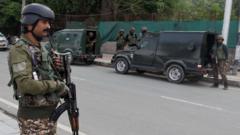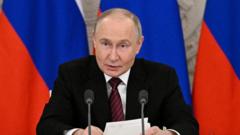Following intense cross-border clashes, India and Pakistan have announced a ceasefire, primarily facilitated by US mediation and international diplomatic backchannels. The fragile agreement faces skepticism as both nations resume their accusations of violations.
Diplomatic Efforts Avert Escalation: India and Pakistan Reach Ceasefire Agreement

Diplomatic Efforts Avert Escalation: India and Pakistan Reach Ceasefire Agreement
US mediators play a crucial role in defusing tensions between nuclear-armed neighbors India and Pakistan, as both sides agree to a ceasefire after days of violent clashes.
In a surprising twist, US President Donald Trump announced a ceasefire between India and Pakistan on Saturday, following four days of escalating tensions characterized by cross-border clashes. Behind the scenes, US mediators, along with regional participants, played a vital role in preventing what could have escalated into full-scale conflict, experts assert.
Shortly after the ceasefire announcement, however, new allegations of violations surfaced, highlighting the tenuous nature of the agreement. India accused Pakistan of "repeated violations," while Pakistan asserted that its military was acting with "responsibility and restraint."
Tensions escalated due to a recent deadly attack on Indian tourists in Kashmir, which led to Indian airstrikes on Pakistani soil, igniting aerial skirmishes and artillery exchanges in the following days. Each nation claimed significant victories while accusing the other of missile assaults on their airbases.
Tanvi Madan from the Brookings Institution emphasized the critical timing of US Secretary of State Marco Rubio's call to Pakistan’s military chief on 9 May. This call was seen as a turning point in diplomatic efforts. There are claims that at least three countries – the US, UK, and Saudi Arabia – were engaged in mitigating the situation simultaneously.
Pakistan's Foreign Minister Ishaq Dar mentioned that "three dozen countries" participated in the diplomatic efforts, illustrating the widespread international interest in reducing tensions in the region. Analysts speculate that an earlier intervention might have prevented some of the escalation.
The US's involvement in mediating past India-Pakistan crises has varied, leading to mixed opinions about its effectiveness. Former US Secretary of State Mike Pompeo previously suggested that US intervention had averted nuclear conflict in past standoffs, yet his perspective was met with skepticism by some diplomats.
US Vice President JD Vance initially maintained a distance from the conflict, emphasizing the difficulty of controlling the actions of sovereign nations. However, as the situation intensified, American authorities began to exert diplomatic pressure.
According to defense analyst Ejaz Haider, the US adopted a more cautious approach this time, observing the escalation before intervening – a departure from swift US involvement in past crises. He pointed out that Pakistan signaled its nuclear strategy even as tensions rose.
Some experts assert that the US played an indispensable role in reaching the ceasefire, with Ashley Tellis from the Carnegie Endowment for International Peace crediting Secretary Rubio's efforts as critical to the outcome.
Indian Prime Minister Narendra Modi's rapport with Trump, coupled with growing strategic relations between the US and India, has provided additional leverage for US diplomacy. Indian diplomats noted that three main channels of communication contributed to the ceasefire: pressure from the US and UK, Saudi mediation, and direct talks between Indian and Pakistani national security advisors.
Despite the immediate agreement, skeptics worry about the ceasefire's longevity due to the speed at which it was arranged amid high tensions. Analysts noted disparities in how India, Pakistan, and the US interpreted the ceasefire conditions, suggesting potential vulnerabilities in the agreement.
As both nations swiftly revert to their narrative of violations, the question remains: how durable is this ceasefire, and whether it holds amidst the complex historical backdrop of India-Pakistan relations remains uncertain.





















